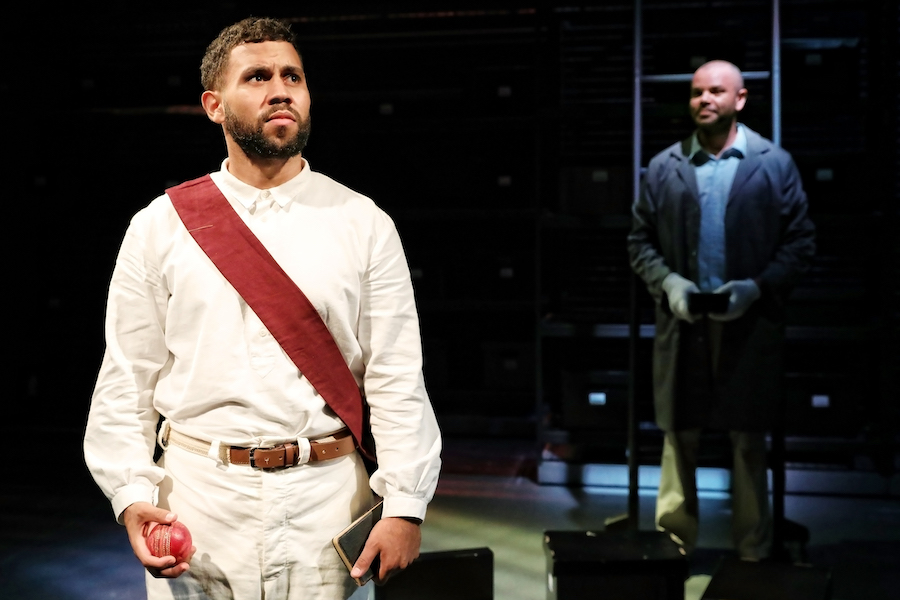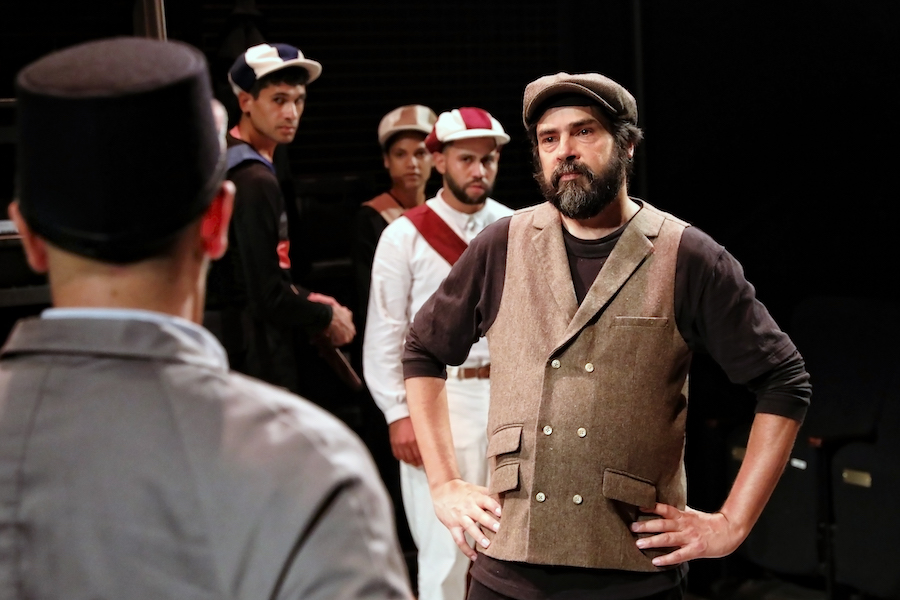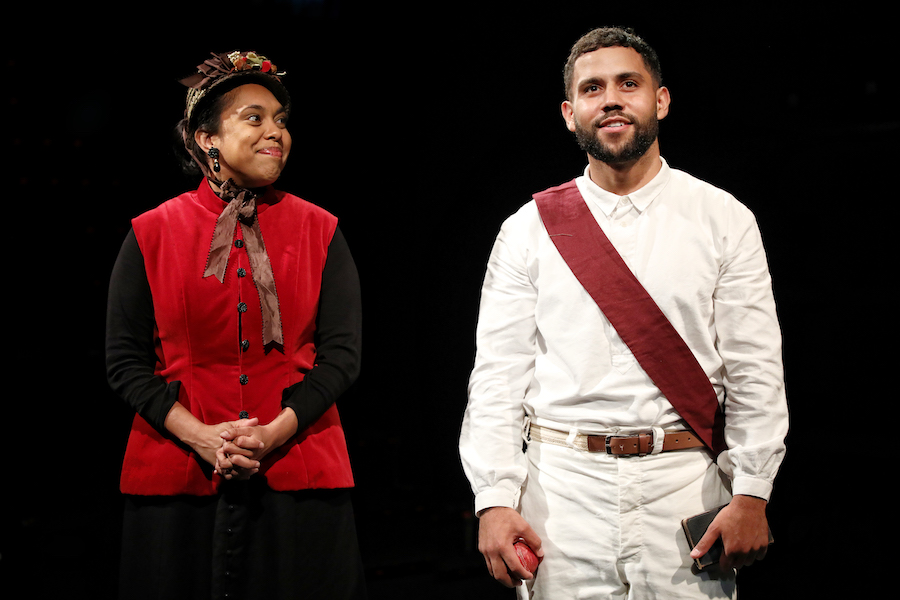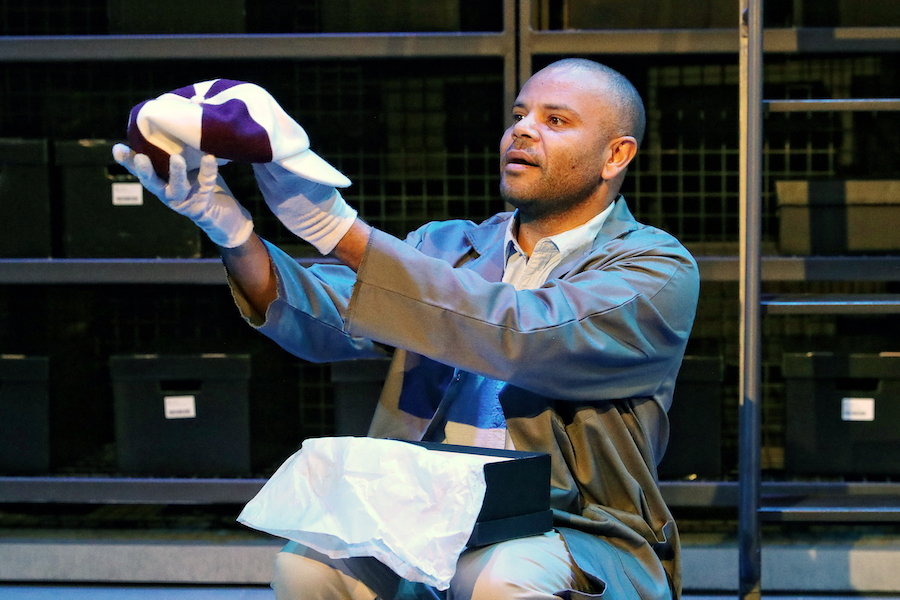“I’m not playing cricket with someone who won’t eat lunch with me,” says Unaarramin, known as Johnny Mullagh. We meet Mullagh in York, England, having walked off the field after being denied entry to a luncheon tent organised by the city’s gentlefolk.
 Aaron McGrath and Luke Carroll in Black Cockatoo. Photo © Prudence Upton
Aaron McGrath and Luke Carroll in Black Cockatoo. Photo © Prudence Upton
A Jardwadjali man from western Victoria born around 1841, Mullagh is the fascinating subject of Black Cockatoo, a new play by Geoffrey Atherden. The star player of a team of Aboriginal cricketers, they made history in 1868 when they became the first team from anywhere in the world to play the English on their home ground. Directed by Wesley Enoch and playing at the Ensemble Theatre as part of Sydney Festival (of which Enoch is the Artistic Director), it’s a warm-hearted but not unsearching look at Mullagh’s little-known life and legacy, tracing its reverberations in the present.
This is neatly accomplished by a framing device in which a group of modern-day Indigenous activists have snuck into a museum after hours in the hope of unearthing and exposing the story of Mullagh and his fellow cricketers. Captained by Englishman Charles Lawrence, we find out how they’re put through a demanding 47-match tour, as well as their forced participation in mock battles and displays of spear and boomerang throwing for the gawking English, all the while garbed in bunk “native costumes”. Needless to say, the players’ cut of the profits from either venture is never quite worked out, Lawrence urging them to take into account how he’s covered their food and board.
 L-R: Luke Carroll, Joseph Althouse, Dubs Yunupingu, Aaron McGrath and Colin Smith in Black Cockatoo. Photo © Prudence Upton
L-R: Luke Carroll, Joseph Althouse, Dubs Yunupingu, Aaron McGrath and Colin Smith in Black Cockatoo. Photo © Prudence Upton
Mullagh’s growing realisation of this injustice, one among many suffered in England, is a crucial driver of the play’s action. Indeed, one of the production’s most indelible moments is when the team must bury one of their own on tour, the death occasioned in part by exposure to a foreign country. Beautifully staged by Enoch, with set and costumes by Richard Roberts and lighting by Trent Suidgeest, the switch to Wergaia language is a poignant reminder of the vast gulf between England and home, something that recurs throughout the play.
Yet even as Mullagh and his teammates grapple with their dislocation in a strange country, Black Cockatoo shows us how this dislocation leads Mullagh to develop new desires and ambitions, partly fired by his friendship with Lady Bardwell, a widow who first points out his exploitation at the hands of Charles Lawrence. Although Mullagh’s repeated mantra is “be polite, but not too bright”, a necessary means of self-preservation, he soon begins to learn to read and present himself in the clothes of an “an earl or viscount”. Atherden has us see such decisions as part of Mullagh’s wider desire to beat the English at their own game, both on the cricket field and off. One of the play’s sharpest bits of commentary comes when Lawrence recoils at Mullagh addressing him as “Charlie”, the deployment of which mirrors the racially shaded diminution of Mullagh’s own given name, John, something that Lady Bardwell earlier identifies as disrespectful.
 Chenoa Deemal and Aaron McGrath in Black Cockatoo. Photo © Prudence Upton
Chenoa Deemal and Aaron McGrath in Black Cockatoo. Photo © Prudence Upton
Subtle touches like these would likely have strengthened the play’s present-day scenes in the museum, where characters sometimes bluntly announce their ideas on the efficacy of peaceful protest or continuing colonial injustice. Some stretches of the play could also be tightened up – though enjoyable, not all the scenes with Lady Bardwell advance the story – and it seems a missed opportunity not to see Mullagh interact more with his teammates. Without these exchanges, we get only a vague sense of who Mullagh is amongst his own people, meaning the play’s conclusion – which sees their return home marked by the introduction of the devastating Aboriginal Protection Act – registers less powerfully than it might have.
 Luke Carroll in Black Cockatoo. Photo © Prudence Upton
Luke Carroll in Black Cockatoo. Photo © Prudence Upton
One of Black Cockatoo’s great strengths is the cast of six, all of whom are Indigenous and play a bevy of black and white characters across time. Aaron McGrath imbues Mullagh with a quiet vitality and conviction, steady in the face of indignity, while Chenoa Deemal brings a light comic hand as well as extra dimension to Lady Bardwell. As activists Brandon and Kimberley, Joseph Althouse and Dubs Yunupingu show themselves nimble sparrers, while their take on a number of butlers and ladies’ maids never failed to make the audience laugh. Colin Smith makes a particularly strong impression as Lawrence, surprised that his selflessness should be taken otherwise. And serving as narrator, Luke Carroll is charismatic and assured, the anchor in Black Cockatoo’s weighing up of truth and cultural memory.
Black Cockatoo will play at Sydney’s Ensemble Theatre as part of Sydney Festival until February 8 and then Riverside Theatres, Parramatta, February 18 – 22











Comments
Log in to join the conversation.